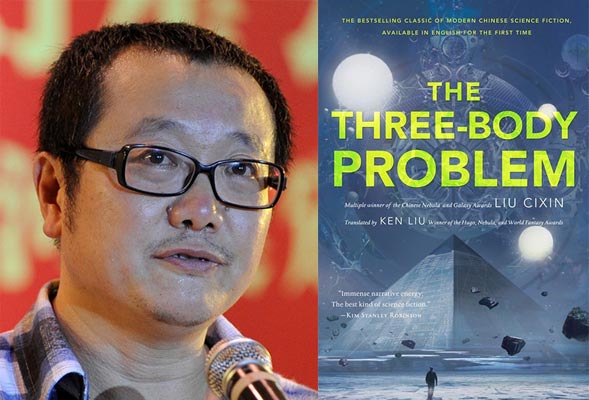Mixed reactions as 'Three-Body Problem' wins Hugo Award
 0 Comment(s)
0 Comment(s) Print
Print E-mail Xinhua, August 24, 2015
E-mail Xinhua, August 24, 2015
Chinese sci-fi bestseller "The Three-Body Problem" won the 2015 Hugo Award for Best Novel on Sunday, sending ripples of excitement across China's Internet and the sci-fi community.
 |
|
Chinese writer Liu Cixin won a Hugo Award for his novel The Three-Body Problem. [Photo/China Daily] |
Liu Cixin was the first Asian writer to win the Hugo Award, deemed as the highest honor for science fiction works along with the Nebula Awards.
The series portrays the centuries of clashes between earthlings and the Trisolaran civilization living in a three-sun system.
In a telephone interview with Xinhua, Liu said he was "very happy" about the accolade but "will treat the award with a humble attitude and won't get overwhelmed."
Liu said the accolade would boost the export of Chinese sci-fi works to the United States and help Americans better understand Chinese sci-fis, but he refrained from overestimating its boost on China's sci-fi writing.
"Science fiction writing across the world is on a decline ... which I assume is because technology is losing its mystery, while mystery is an important backbone of sci-fi composition," he said.
'Historic breakthrough'
Science fictions remain a small literary genre in China despite people's love for new-tech gadgets like Apple Watch and Hollywood sci-fi films. But enthusiasm has been fanned up by a number of good news in recent years, including the announcement that the movie adaption of "The Three-Body Problem" has completed filming and will hit screen next year.
The Hugo prize may be the latest to exhilarate Chinese sci-fi writers and fans. On Sunday, China's cyberspace crackled with posts extending congratulations and expressing pride.
"Science fiction is born and raised in the West, but has also found fertile land in the Orient," Yan Feng, professor with Fudan University and a sci-fi critic, commented on his microblog.
"It marks a historical breakthrough for China's sci-fi," said Yao Haijun, chief editor of Science Fiction World, China's largest sci-fi magazine.
Yao expected the start of an "equal exchange" between Chinese and English sci-fi to change the largely one-way introduction of English works into China in the past.
"Moreover, even though Liu created this miraculous work several years ago, we had little confidence back then. This prize will help us reevaluate our sci-fi," he told Xinhua.
Wu Yan, professor with Beijing Normal University and a sci-fi critic, predicted a sci-fi reading fever following the award.
"It will call more public attentions to Chinese sci-fi writers and their works ... and greatly boost China's sci-fi industry," he told Xinhua.
Wu attributed Liu's Hugo success to the novel's high quality as well as the concerted efforts by Chinese publishers, the book's translator, and many die-hard fans' vigorous promotion.
Published in China between 2006 and 2010, the trilogy has been hailed as the best Chinese sci-fi series with over 1 million copies sold in China. But its first book was not translated into English until 2014.
"The Dark Forest," the second installment of the saga, became available in the United States earlier this month, and translation of the last one, "Death's End," is expected to hit shelves next year.






Go to Forum >>0 Comment(s)